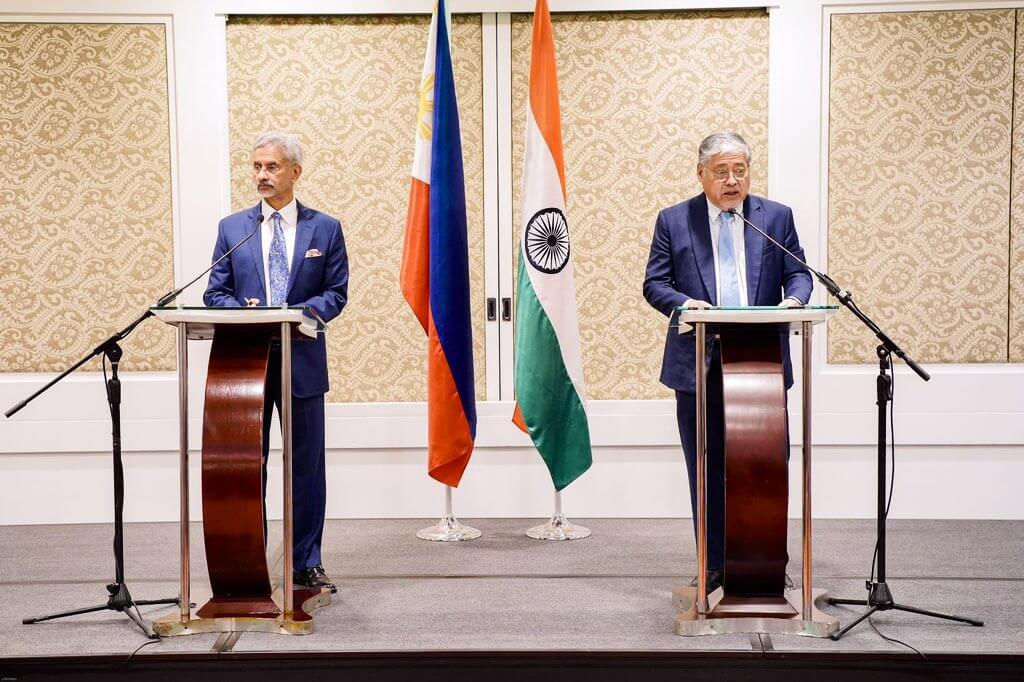After Indian External Affairs Minister (EAM) S. Jaishankar expressed firm support for the Philippines’ national sovereignty during a joint press conference with his Filipino counterpart, Enrique A. Manalo, on Tuesday, Beijing responded by saying that “third parties have no right to interfere” in the ongoing China-Philippines dispute in the South China Sea.
Jaishankar’s Comments, China’s Response
Highlighting the Philippines’ importance to India in the context of ASEAN and the Indo-Pacific, Jaishankar held that “the progress and prosperity of this region is best served by staunch adherence to a rules-based order.”
Calling the UN Convention on the Laws of Sea (UNCLOS) 1982 as the “constitution of the seas,” he said that all parties must adhere to it in its entirety “in letter and spirit.” UNCLOS is the international agreement that establishes the legal framework for marine and maritime activities.
Addressing the Press Conference with @SecManalo of Philippines. https://t.co/OnvTzCjbjk
— Dr. S. Jaishankar (Modi Ka Parivar) (@DrSJaishankar) March 26, 2024
The EAM’s comments came amid the latest escalation in the China-Philippines dispute, as a Chinese coast guard ship hit a Filipino boat with water cannons in the disputed South China Sea on 23 March. The South China Sea is a strategically important but disputed region that is claimed by China but counterclaimed by the Philippines, Vietnam, Malaysia, Brunei, and Taiwan.
Vigorously countering Indian comments on the issue, Lin Jian, the Chinese Foreign Ministry spokesperson, said that maritime disputes are “issues between the countries concerned.” “We urge relevant parties to face squarely the facts and truth on the South China Sea issue,” he added, while calling on countries to respect China’s territorial sovereignty, maritime rights and interests, and regional countries’ efforts to keep the South China Sea peaceful and stable. Presently, the Philippines and China are involved in a diplomatic spat over the Second Thomas Shoal in the contested region.
India-Philippines Defence Cooperation
Jaishankar said, “India’s ties with the Philippines have seen very perceptible growth in recent time.” He added that India would consider cooperating with the Philippines in defence and security.
In his meeting with Manalo, the EAM discussed a plethora of topics, including politics, defence, security and maritime cooperation, trade and investment, infrastructure, and development cooperation. Education, digital technology, culture, and consular domains also featured in the discussions.
Additionally, the two leaders discussed global, regional, and multilateral issues, including the war in Ukraine and the crisis in West Asia. They also spoke about the Indo-Pacific, NAM, and the UN.
Filipino President Thanks India
Jaishankar also called on President Ferdinand “Bongbong” Marcos at the Malacañan Palace in Manila and conveyed the personal greetings of Indian President Droupadi Murmu and PM Narendra Modi. During the meeting, the Filipino President thanked the Indian government for their “swift and decisive action in rescuing Filipino seafarers involved in the MV True Confidence incident.” INS Kolkata had rescued the crew from the ship after it was attacked by Houthis on 6 March, killing three people, including two Filipinos.
As part of his trip, the EAM also visited the Indian Coast Guard Ship Samudra Paheredar during its port call to Manila. The ship is in the country as a part of an overseas deployment to ASEAN nations.
PBBM expressed appreciation to the government of India for its “swift and decisive action” in rescuing Filipino crew members of MV True Confidence, the merchant ship attacked by Houthi rebels while plying the Gulf of Aden on March 6.https://t.co/pcwtZLWQDc
— Philippine News Agency (@pnagovph) March 27, 2024
Further, Jaishankar met Defence Secretary Gilbert Teodoro, with whom he discussed strengthening the defence ties between the two nations. The two sides reflected on their shared interests in the Indo-Pacific and talked about enhancing capabilities and intensifying exchanges and closer contacts.
Additionally, he met the National Security Advisor Eduardo Año and Department of Information and Communications Technology (DICT) Secretary Ivan John Uy to discuss technology advancements and contemporary challenges.

